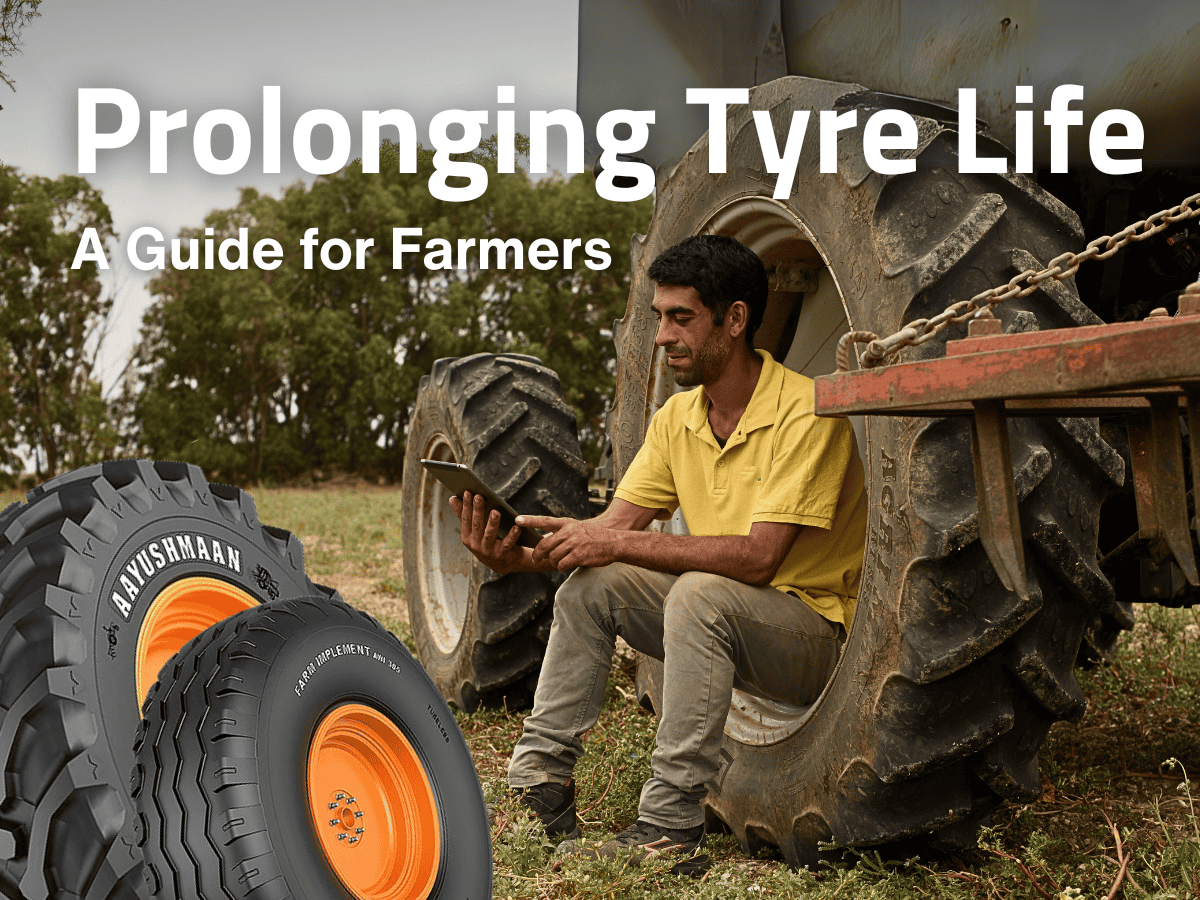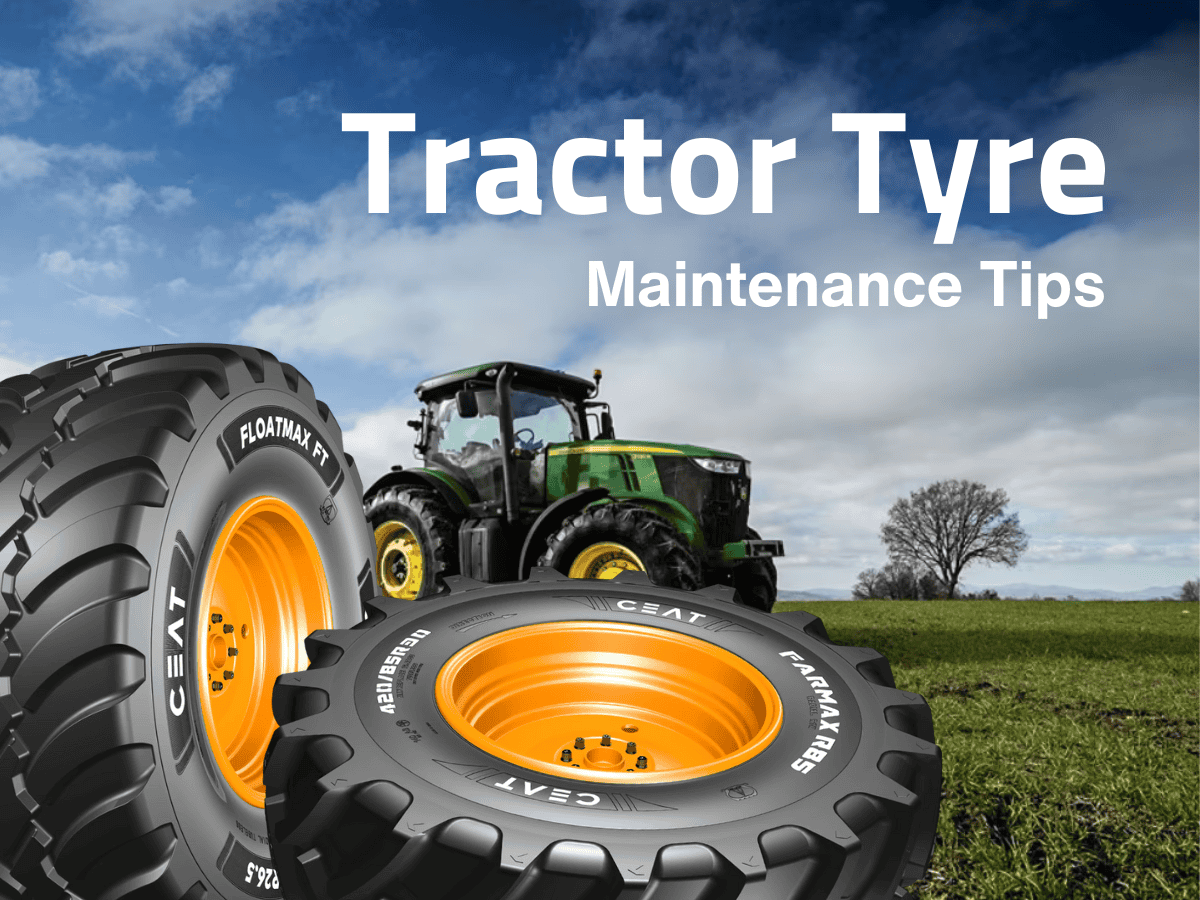ceat-speciality:blogs-tags/all,ceat-speciality:blogs-tags/tyre-care
Prolonging Tyre Life: A Guide for Farmers
Wed, 1 Jan 2025 | PRODUCTS
Farm vehicles and machinery, from tractors to harvesters, are essential tools in modern farming. These vehicles are subjected to heavy loads, rough terrains, and long working hours, making their tyres a vital component for both performance and safety.
As farmers know, the cost of replacing tyres can be significant, so taking steps to prolong the life of your tyres is not just a matter of convenience—it’s a matter of saving money and maintaining efficiency in your operations.
In this guide, we’ll explore practical steps farmers can take to extend the lifespan of their agricultural tyres, helping them get more value for their investment while ensuring the smooth running of their equipment.
1. Choose the Right Tyres for Your Needs
One of the most important decisions you can make in prolonging tyre life is choosing the right tyre for your specific farming requirements. Different agricultural tasks—such as ploughing, harvesting, or hauling—put different stresses on tyres. Selecting farm tyres designed for your specific conditions can ensure better performance, longevity, and efficiency.
For example, CEAT Specialty offers farm tractor tyres designed with advanced tread patterns and reinforced sidewalls that enhance durability under heavy loads. Whether you are working on rough, uneven terrain or need tyres that can withstand the weight of heavy farm machinery, choosing tyres that match your needs is the first step toward ensuring a long life.
2. Proper Inflation is Key
Maintaining the correct air pressure is one of the most effective ways to extend the life of your tyres. Under-inflated tyres can lead to excessive wear on the tread, heat buildup, and even tyre blowouts, while over-inflated tyres result in poor traction and uneven wear patterns. Both scenarios reduce the lifespan of your tyres and compromise vehicle performance.
Check the air pressure regularly, especially before starting any farming task. Use a reliable tyre pressure gauge and follow the manufacturer’s recommendations for the correct inflation pressure. Keep in mind that tyre pressure may fluctuate with temperature changes, so always adjust according to current conditions.
3. Regular Inspections and Maintenance
Just as you maintain your equipment to keep it running smoothly, your tyres also require regular inspections. At least once a week (or more frequently in busy seasons), check your tyres for signs of wear and tear, such as:
- Uneven tread wear: This can be a sign of improper alignment or inflation.
- Cracks or bulges: These can indicate structural damage or ageing.
- Foreign objects: Nails, stones, or sharp debris embedded in the tyre can cause slow leaks or punctures.
- Cuts: These can be a result of rough terrain or contact with sharp objects.
Performing these inspections will help you catch potential issues early and take corrective action before they lead to more serious damage, saving you from costly replacements.
4. Load Distribution and Weight Management
Overloading farm machinery or unevenly distributing the load can put unnecessary strain on your tyres, leading to premature wear. To avoid this, ensure that your equipment is not carrying more weight than it’s designed to handle. Also, distribute the weight evenly across the tyres to prevent any single tyre from bearing too much load.
When using equipment such as trailers or harvesters, always check the weight limits specified by the manufacturer. Additionally, avoid sudden accelerations or hard stops, as these can increase the wear on tyres and reduce their lifespan.
5. Rotate and Balance Tyres Regularly
Just like car tyres, the tyres on agricultural vehicles benefit from regular rotation. When tyres wear unevenly, the lifespan of each tyre is shortened. Rotating the tyres ensures that they wear more evenly, which can improve tyre performance and extend their useful life.
If possible, have your tyres balanced as well. Imbalances can cause uneven wear patterns and vibrations, leading to tyre damage. Regular rotation and balancing ensure that all tyres wear evenly, helping you get the most out of your investment.
6. Be Mindful of Road Conditions
Tyres on farm equipment are often subjected to rough terrains, including rocky fields, muddy paths, and bumpy roads. While these conditions are unavoidable, there are a few strategies farmers can adopt to mitigate the effects of such harsh terrains on their tyres.
- Slow down on rough roads: Avoid speeding over bumpy, uneven terrain. High speeds exacerbate the impact on tyres and can cause quicker wear.
- Use appropriate tyres for different conditions: If you’re working in particularly muddy or soft soil, using flotation tyres with larger surface areas can help reduce the strain on the tyre and improve its lifespan.
Investing in tyres designed for specific terrains can go a long way in extending their life.
7. Proper Storage Practices
When your farm equipment is not in use, especially during off-seasons, proper storage is crucial for maintaining tyre health. Prolonged exposure to sunlight, ozone, and harsh weather conditions can degrade tyre materials, causing cracking and premature ageing.
To store your tyres properly, keep them in a cool, dry place away from direct sunlight. If possible, store your equipment indoors, or use tyre covers to shield them from the elements. Additionally, regularly inspect the tyres for any signs of wear during storage to ensure they are in good condition when you’re ready to use them again.
8. Use Tyre Protection Products
Consider using tyre protection products such as tyre sealants or rim protectors to further extend the life of your tyres. These products can help prevent minor punctures, reduce the risk of tyre damage from rocks and debris, and even improve the overall traction and stability of your tyres.
Conclusion
Taking care of your agricultural tyres is essential for maintaining the efficiency of your farm operations and ensuring that your equipment runs smoothly for years to come.
Prolonging tyre life isn’t just about cutting costs—it’s about making sure that your equipment can keep up with the demands of modern farming, season after season. With these simple steps, you’ll protect your investment and ensure that your farming operation remains safe, efficient, and profitable.



























































































































